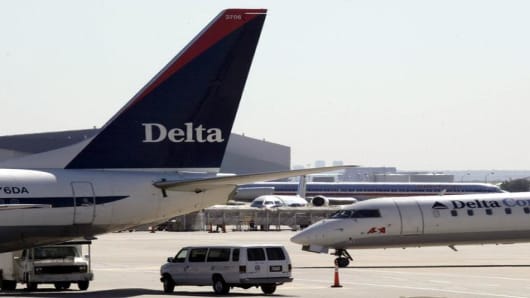Delta Air Lines and Northwest Airlines said on Monday they have agreed to merge in a deal valued at more than $3 billion, aiming to cut costs amid skyrocketing fuel prices and compete better globally.
Under the terms of the proposed deal, which would create the world's largest airline, Delta will acquire Northwest in an all-stock swap in which Northwest shareholders will receive 1.25 Delta shares for each Northwest share they own.
Northwest shareholders will get $13.10 per share in Delta stock based on Monday's closing price of $11.22 a share, representing a 17 percent premium to Northwest shares' close.
After racking up $35 billion in losses and finally emerging from a five-year slump in 2006, U.S. airlines are hoping that mergers could lead to higher fares as combined carriers reduce flights and use their increased market power to raise prices.
The airlines also feel an urgent need to consolidate and cut costs in order to weather high fuel prices, a weak economy and a growing competitive threat from European carriers as trade barriers fall on trans-Atlantic travel.
The enterprise value of the combined airline is expected to be $17.7 billion.
This merger could also speed up another tie-up -- that of Continental Airlines and United Airlines, whose parent is UAL.
Those two carriers have laid most of the groundwork for a merger, two people briefed on the matter said, and could have a deal ready "pretty quickly" following the Delta and Northwest announcement, one of them said earlier Monday.
The Big Carrier
The new Delta Air Lines will still be headquartered in Atlanta and operate under Delta's flag, but now with over $35 billion in annual revenue and about 75,000 employees. Delta Chief Executive Richard Anderson will lead the combined airline.
Delta's pilots would get a 3.5 percent equity stake in the new company while U.S.-based non-pilot employees of both airlines would be given a 4 percent equity stake upon closing of the deal.
"It's a very optimistic view on an industry that's been very dismal for the last couple of weeks," said airline consultant Robert Mann.
The deal will combine Delta's strong Atlanta hub and its trans-Atlantic route network, with Northwest's extensive Asian presence, including a hub in Tokyo. There will be no hub closures, Delta said.
Mann said it would be tricky for Delta to deliver on its promise to retain all hubs. "It would be nice if it were true," he said.
Northwest Pilots Opposed
Previous talks stalled in February after pilots' unions at Delta and Northwest failed to agree on how to combine the seniority lists of the two groups.
Delta previously had indicated it would delay merger plans until pilots -- the airline's only major unionized group -- agreed to an integration deal.
But the airlines have decided to go ahead with the merger to create efficiencies that will offset soaring fuel prices and enable the new carrier to better compete internationally.
Delta and Northwest said the deal promises to generate $1 billion in annual revenue and cost synergies.
The Northwest pilots union said in a statement: "This agreement clearly disadvantages NWA pilots both with respect to economic issues and seniority list integration."
"The NWA MEC will use all resources available to aggressively oppose the merger."
Delta, the third-largest U.S. carrier and Northwest, the fifth-largest, still have to get the deal past antitrust authorities, which have scuttled previous airline merger proposals, and overcome objections from pilots' groups and other employee unions.


